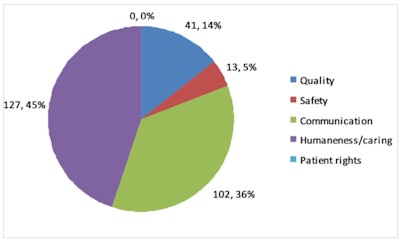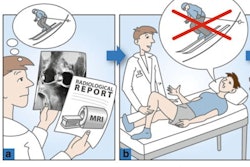
Most patients are extremely satisfied with their radiologist, but there's still scope to reduce the number of negative experiences, according to the authors of a Dutch survey. They've included details of 10 deeply critical reviews from which lessons can be learned.
"Communication and empathy appear to be the most important skills on which radiologists are judged from a patient's perspective," wrote radiologists Dr. Robert M. Kwee, PhD, of Zuyderland Medical Center, and Dr. Thomas C. Kwee, PhD, from University Medical Center Groningen, both in the Netherlands, in an article posted online by the European Journal of Radiology on 3 May.
They found that 217 of the country's 941 radiologists (23%) were reviewed by patients between 2017 and 2021. The 217 radiologists came from 75 institutions (6 academic and 69 nonacademic).
The median score assigned to each review was 9.6 (interquartile range 1.3, range 1-10). 74 of the 217 radiologists (34%) received a maximum review score of 10, but 29 got a review score of 5 or less. Most reviews concerned communication (36% of all positive patient reviews and 30% of all negative patient reviews) and humaneness/caring (45% of all positive patient reviews and 49% of all negative patient reviews).
The authors highlighted the following negative comments from patients:
- This radiologist had a very indifferent and uncompassionate attitude and did not give me the feeling of being heard at all.
He ignored my complaint without giving a proper explanation. He gave me the feeling that I was seeking attention and he thought that my insistence on looking a little further was nonsense. Furthermore, I did not feel that he was really interested or taking the time to listen to me. After being expelled three times in a year without a biopsy, my entire breast turned out to be full of breast cancer of a form not seen on mammography or ultrasound. Incidentally, 20% of breast cancer has this form. Had he been more incisive, I might have been able to keep my breasts.
- This man swears at patients and employees. He is absolutely unwilling to explain or listen to anything.
He believes that many of his procedures should be performed without any anesthetic. If something went wrong (transient ischemic attack during repeated puncture), he blamed me that I was tensed. He sent me home with hemiplegic symptoms and did not immediately refer me to a neurologist. It was a bizarre experience.
- Abusive attitude. I was treated very unpleasantly and did not feel taken seriously.
- This doctor does not communicate with patients before and during the examination, she does not explain what she does and observes.
She hides behind her protocol when inquiring. This puts the patient in even greater uncertainty than before the examination. She indicates that she does not want to raise questions from the (in her eyes clearly stupid and ignorant) patient, but it results in even more questions and uncertainty. This old-fashioned form of medicine, this paternalistic form, is really no longer possible. It seems as if she feels elevated above the patient, or is it her own insecurity?! Surely the examination is about the patient, not the doctor!
- Very bad experience. Doctor was in a rush because she had to go to meeting. Unsympathetic and unskilled.
- Mrs. P is extremely authoritarian, did not listen at all and does not listen to the patient's story.
She reacted angrily to questions that were contradictory in her experience and snapped at me. I do not have any faith in this doctor and recommend that she takes a patient management course. However, it is doubtful whether this would lead to the desired result.
- Madam performed the breast biopsy. She did not take a moment to reassure me, even though I repeatedly indicated that I was very nervous and anxious about the previous traumatic experience with puncture.
She did not listen to my wish to use a thinner needle for the anesthetic, I had to close my eyes. During the biopsy, no answer was given when I asked in fear what was going to happen next. She did not wait either for the anesthetic to work. Her approach resulted in unnecessary and indescribable pain, total panic, crying and hyperventilating. I felt treated like a piece of meat. This lady is no longer touching my body. Despite her ability to perform the biopsy, she does not listen to what the patient has to say and does not have the qualities to reassure the patient.
- There is a missed diagnosis of colon cancer on the CT colonography. This has resulted in a delay of 8 months to start treatment. The sad thing is, the radiologist has not expressed any regret.
- A very tactless man in the way he expresses his findings, otherwise very uninterested and arrogant.
- He immediately proceeded with the procedure without any explanation of what he was going to do.
Furthermore, he did not announce when he would give me anesthetic and other things. When I indicated that I didn't like it, he ignored this. In short, I did not feel heard and treated worthless!
According to the authors of the EJR paper, "Our study also shows that patients particularly appreciate radiologists with communication and empathic skills, whereas the lack of these skills is the major source of patient discontent with the service provided by radiologists. In addition, communication and empathic skills by far outnumbered clinical competencies as reasons for patient (dis)satisfaction (81% vs. 19%)."
 Total number and percentage of negative patient reviews (i.e., the patient was dissatisfied) in the domains "clinical competencies" (categories: quality and safety of clinical care) and "relationships" (categories: communication, humaneness/caring, and patient rights). Figure courtesy of the European Journal of Radiology.
Total number and percentage of negative patient reviews (i.e., the patient was dissatisfied) in the domains "clinical competencies" (categories: quality and safety of clinical care) and "relationships" (categories: communication, humaneness/caring, and patient rights). Figure courtesy of the European Journal of Radiology.The relatively low percentage of radiologists (23%) who were reviewed may be due to the fact that many patients are not aware of radiology as a profession, they stated, adding that the professional visibility of radiologists could be improved by radiology-led research and teaching.



















